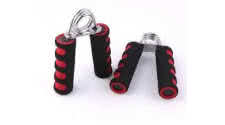Where you place your hands during a row has an impact on the recruitment of your back muscles, not to mention the assistive
muscles involved. To keep things simple, focus on the three major hand positions: pronated (palms down), supinated (palms up)
and neutral (palms facing each other).
Pronated Grip
This grip places your shoulder joints in an internally rotated position, which can decrease the amount of
force being produced by your lats and teres major as you pull your arms back from in front of your body. Why? Because your
lats and teres major assist in internal shoulder rotation, they begin the rowing motion in a shortened position. The trade-off
is that this grip should enable you to increase the workload on your rhomboids and middle and lower traps.
Supinated Grip
As you rotate your forearms to turn your palms up, your shoulders rotate externally. This causes your lats
and teres major to be pre-stretched, since those muscles play roles in both internal rotation and extension at the shoulder
joints. The greater the initial stretch, the greater the force at which a muscle can contract so, all things being equal, a
supinated grip works your lats and teres major more strongly than other grips will. It's the same reason you perform overhead
triceps movements to emphasize the long head of your triceps - because that head begins in a fully stretched position.
Neutral Grip
For many bodybuilders, this is the most comfortable of the three major grips, so it may allow you to use the most
weight. Your shoulders are neither internally nor externally rotated here, so the direction in which you pull your arms will
decide which muscles take the brunt of the load. If you keep your arms close to your sides and pull your elbows straight behind
your body, you'll likely feel the exercise primarily in your lats and teres major. Keep your elbows out and away from your
sides as you pull your elbows back, however, and your middle and lower traps and rhomboids start to take over.
One Final Note about Grips
When attempting heavy rows, consider using lifting straps, which take the onus off your forearm
and grip strength and allow you to focus on pulling with your back muscles.
